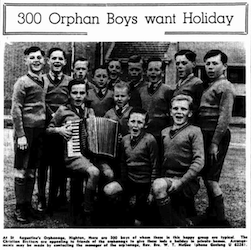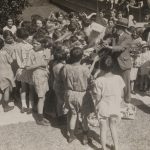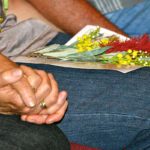Reblog - Holidays out of Home
- Jan 12, 2024
- In Features
First published back in 2021, this blog post provides a taste of what Christmas and the summer holidays were like for children who lived out of home.
For children in care, summer came with the opportunity of a holiday away from the institution where they lived.
These holidays could be with ‘holiday hosts’ – people who would take the children for weekends or longer; or at holiday homes, often close to the beach, that were owned by the institution.
These experiences were vastly different for the children involved, with some forming ongoing relationships with ‘holiday host’ families that would then support them as they left the institution, and others being used as free labour and abused.
These are some of the experiences children in care had over their summer holidays.
Advocate, 1951. Caption reads: At St Augustine’s Orphanage, Highton, there are 300 boys of whom those in this happy group are typical. The Christian Brothers are appealing to friends of the orphanage to give these lads a holiday in private-homes. Arrangements may be made by contacting the manager of the orphanage, Rev. Bro. W. T. McGee (phone Geelong U 6226)
“The first thing we did was to have a bath. We loved that big old bath tub, never had one at the “Home” that we knew of, we used to sit and slide along the side … and down the slope of the end of it. As luck would have it, it was about time for our bath anyway ready for the evening, so bathing and clean cloths were in order… After dinner we often played a bit of billiards on the full size table, prior to being read a story before bed.” Wayne Lewis in his blog post “Illegally adopted” at the National Museum of Australia’s Inside – Life in Children’s Homes & Institutions
“I don’t recall the number of foster homes I was sent to, but many of these people had no intention of having a child for the holidays to give them some home comforts, and a taste of family life, some wanted housemaids, someone to do the housework and watch the younger children and it was often a relief to get back to the orphanage.” Rosalie Bridgland, submission 351 to the Senate Inquiry into Children in Institutional Care
Port Kennedy Beach Camp 1979
“After Christmas we went to the Orphanage’s Queenscliff Rest Home in Stevens Street for two precious weeks. Parole in paradise. Singing every mile, we travelled by slow train to Geelong, and the rest of the way by bus… We could choose which end of the bunk to have our pillow. We could be head-to-head with a friend, or touch toes—a trifling choice, but it meant a lot to us. It seemed the sort of decision normal children would be allowed to make.
Every day, the Orpho children walked to the back beach, with miles of clean, hot sand to sunbake on and heavy waves for body surfing. Waddling back from the beach with sand in the groin, we stopped at the old corner shop to buy ice blocks for a penny or, splashing out, a bottle of soft drink with a screw-top which was a shilling with a penny return on the bottle. If you couldn’t afford the screw-top bottle, you might settle for a fixed-top. If you drove a small nail into the top to make a hole, the contents could be savoured drop-by-drop giving satisfaction for hours. Queenscliff was, then, a place to relax. Day in day out we could lie in the sun for hours or roll in with the breakers”. In Frank Golding’s memoir An orphan’s escape (2005)









Greg Baker
January 12, 2024 11:40 amAt Christmas time the staff wanted us kids out of the way so they could have a break. We were sent to complete strangers whom we had never met before. They were good folk from around the Orange area but I felt uncomfortable amongst strangers. I never had one holiday with my brother. One Christmas in particular I was on a farm we worked the whole holiday six days per week, twelve hours per day. There were acres and acres of bailed hay to be picked up and we did this for 4 weeks. We then moved on to making chaff by the bag full for the following 2 weeks. Nothing but rashes from day one, I was actually glad to get back to Buena Vista so I could have a “holiday”.
Another one of these holidays was with an elderly couple that had manned the railway crossing at Borenore. I did absolutely nothing for the entire 6 weeks. No work, no visits, no outings, no nothing… I did, however, find a rosella’s nest in the hollow of a gatepost, which looked as if it had been abandoned. Two of the chicks were dead but one was alive. I took it back to the elderly couple and they showed me how to feed the baby with a mixture of porridge. It survived and grew and I used to clean its beak because the porridge would stick to the top of it. It was good to have something dependent on me for a change and something, which responded to me. One day the old couple took me aside and asked if I would like to be their foster child. I said no because I didn’t feel that I could live with them while I still had parents. For years I blamed Mum for breaking up the marriage and leaving me alone without a Dad.
Greg Baker
January 12, 2024 11:36 amPorter’s wisdom and justice was the way he kept my pocket money that I had earned doing jobs before and after school. Straight after school I would ride my bike to a local Chinese shop and peel and chip one bathtub full of potatoes. I got a dollar a day for that but the best part was I could sit down and have a Chinese meal each night before going back to the orphanage. In the mornings I got up at 5.3O a.m. each day and rode some three miles to a service station, picked up a squeegee and bucket with some complementary cards from the service station next to the Max Stuart car dealership. I would then ride my bike to several motels and wash the windscreens of each car parked in front of the motel suites. I would place a complementary card on the windscreen in the hope they would buy petrol from the garage. I set off the odd car alarm in doing so. In winter it was too cold to use tap water as it was frozen in the pipes, so I had to wait for the kitchen to open so I could use warm water.
I would finish by 7.3O a.m. and go back to the orphanage for breakfast and then go to school. I went around looking for jobs. I would go to the local stables and sift through the pile of hay and manure to bag for the garden. Cowpats from a farm were also very popular. On the weekends I would mow two lawns and regularly wash a car. I was earning about $16 per week in total of which Porter kept $14 as he put it, “to help Buena Vista with its money problems.”
Find & Connect
January 12, 2024 11:40 amThanks for your story, Greg